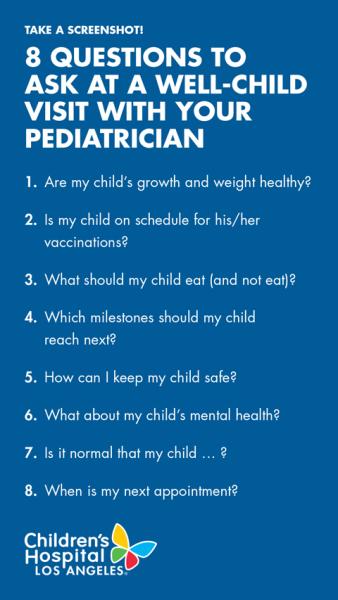
8 Questions to Ask at a Well-Child Visit With Your Pediatrician
A well-child visit is an important part of keeping your child healthy. From babyhood through the teen years, these routine checkups are a great time to talk to your doctor about your child’s growth, development and behavior.
Lauren Nguyen, MD, MPH, a pediatrician with Children’s Medical Group in Torrance, California, part of the Children’s Hospital Los Angeles Care Network, shares eight key questions to ask your pediatrician during your appointment.
1. Are my child’s growth and weight healthy?
At each visit, your doctor will do basic measurements of your child, including height and weight (and head circumference for babies and toddlers).
“Children are in a rapid phase of growth, so we want to make sure they’re following their own growth curve,” Dr. Nguyen says. “If there are any dramatic changes or concerns about that growth, the pediatrician will address them.”
Growth and weight are important beyond the baby years. For older children and teens, gaining too much weight is a common issue. Other children may experience early puberty. Talk to your doctor about any concerns you have about your child’s growth.
2. Is my child on schedule for his/her vaccinations?
At the end of the visit, your child will receive any needed vaccinations. These shots are critical for protecting your child from a host of serious diseases, including whooping cough, polio, measles and more.
Your doctor should explain which vaccines your child is receiving and what they protect against. Ask which shots are coming up for the next visit as well.
“It’s extremely important for your child to not only get these vaccinations, but to also get them on schedule,” Dr. Nguyen says. “It can sometimes take weeks or multiple doses of a vaccine before a child is fully protected. The schedule is carefully designed to make sure your child is protected at the right time.”
Children will receive most vaccinations before the age of 6 or after 10 years old. But don’t skip a well-child visit during this gap just because no shots are needed. These are key growing years, plus your child should receive the flu shot every year, so it’s important to still have regular checkups with your pediatrician.
3. What should my child eat (and not eat)?
Nutrition is a big part of a child’s growth and development. Talk to the doctor about your child’s diet. For babies and toddlers, you might have questions around breastfeeding, when to introduce solid foods and what to do if your child is a picky eater.
Ask your doctor which foods your child should eat—and which they should not. Dr. Nguyen tells her patients to avoid juices and sodas, for example. “You want to establish healthy behaviors at a young age,” she says. “It’s so much harder to change these habits later on.”
Be sure to also tell your doctor about any vitamins or supplements your child is taking. “Gummy vitamins have become very popular for young children, but they’re one of the biggest causes of childhood cavities,” Dr. Nguyen explains. “A multivitamin is fine, but it should be a chewable tablet.”
4. Which milestones should my child reach next?
Your doctor will want to know if your child is achieving the typical milestones for his or her age group. In the early years, these include smiling, walking, throwing, grabbing and talking. In addition, ask which milestones your child should reach by the next appointment.
“For example, at the 15-month checkup I’ll say, ‘By 18 months, I’d like your baby to be able to say 10 words, to be able to almost run, to scribble and color and use utensils,’” Dr. Nguyen explains. “That lets parents know what to look for in their baby’s development.”
5. How can I keep my child safe?
For babies and toddlers, safety questions can cover car seats, child-proofing your home, sun exposure and more. For older children, questions might include: When can my child graduate from a booster seat? How much screen time is appropriate?
For adolescents and teens, safety conversations often center around social media use, drugs and alcohol, and sex. Your pediatrician may want to talk one-on-one with your teen about these issues. Talk to your doctor about what you are comfortable with.
6. What about my child’s mental health?
Mental health is important at every age, but this is a particular focus for adolescents. Is your child depressed or anxious? Struggling in school? Having trouble making friends?
“There is a significant increase of depression and anxiety right now among children and adolescents,” Dr. Nguyen says. “The earlier you can identify a mental health issue, the earlier you can treat it. Don’t be afraid to bring up these issues.”
7. Is it normal that my child … ?
This can be anything you’re concerned about—from a recurring rash or a strange bump to weight gain, picky eating or trouble making friends.
Tip: Write down your questions before the appointment. Put the most important ones at the top of the list. If a question comes up after your appointment, call and ask.
“Parents know their child best,” Dr. Nguyen says. “If you feel something is off, definitely ask your pediatrician. There might be an issue we need to address. Fortunately, most of the time your doctor can reassure you that your child is fine.”
8. When is my next appointment?
Before you head home, don’t forget to book your next well-child visit.
“Many parents don’t schedule that next visit, and then it’s easy to start falling behind,” Dr. Nguyen says. “You can always change the date later if you need to. Making the appointment while you’re still at the office is the best way to ensure you’ll stay on track.”



